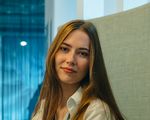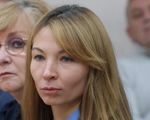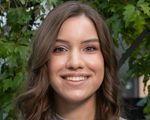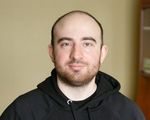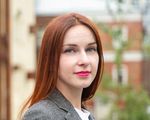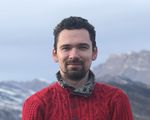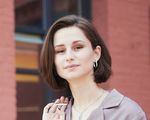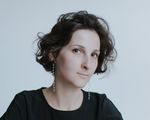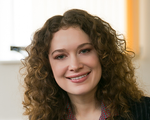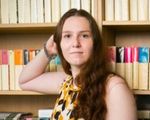About Success Builder
How do you find your place in life? How do you find something to do that both comes naturally to you and makes you happy? The answer is that you have to apply the knowledge you’ve gained from university and from life itself correctly. The Success Builder Project features HSE University graduates who have discovered themselves through an interesting business or an unexpected profession. The protagonists share their experiences and lessons learnt and talk about how they’ve made the most of the opportunities they were given.
People in science careers feel especially successful if they aren’t just addressing concrete tasks but are actually helping the world overcome a problem such as the COVID-19 pandemic. HSE School of Sociology graduate Ekaterina Chirikova is now earning her PhD in epidemiology at the University of California, San Francisco, U.S., where her research is directly related to public health. In this interview with Success Builder, she spoke about ethics and the pharmaceutical business, what American epidemiologists do and how to earn a diploma online without ever meeting your science advisor face to face.
How did you choose where to get your higher education?
I had planned to study philosophy. I thought it would help me understand people’s behaviour or simply what’s happening around me. On the one hand, my parents supported me in whatever interested me, but they were also concerned about my future. Sociology was the compromise. It was 2004 and we didn’t immediately find out that in addition to Moscow State University and the Moscow State Institute of International Relations, it was also possible to study sociology at the Higher School of Economics, where it was taught with a more modern approach. We didn’t know enough about it to consider applying. But when the son of my mother’s co-worker, Dmitry Kurakin — who was later my science advisor at the HSE Centre for Fundamental Sociology — told us that nobody teaches sociology better than HSE and that the admissions process was all above board and students were admitted solely on the basis of their hard work and knowledge, that decided it.
Sociology does not seem like an applied science. How did your understanding of it evolve during your studies?
I was interested in the subject itself and I wanted to figure out what kind of science it was. In high school we had classes in social studies, which gave only a vague idea of sociology. Even before I matriculated, I attended meetings of the ‘Gorod’ (City) sociology club founded by HSE School of Sociology students. They held seminars and discussed foundational texts. In short, it was important for them to talk about what HSE sociologists were doing. They got incoming students involved in the discipline, helped them understand what they would be doing as students there, showed them how it was possible to study society, which sociological theories existed and that all of this was very interesting.
It’s inspiring to see senior students passionately discuss Weber’s theory. After matriculating, I became a member of the City Club. We conducted research and seminars, organised science projects for school students and developed as sociologists thanks to each other, and not only our teachers. We also had applied projects. For example, we surveyed students and teachers. Our faculty heads read our reports, which gave them feedback of a sort on how the university was working. These projects have grown into a whole research centre at HSE — the Center for Institutional Research.
How interesting to you was the philosophical side of this science?
I especially liked Durkheim and Bourdieu. In general, all the classical thinkers of sociology worked at a time when there was no distinct line between philosophy, sociology and psychology. I liked reading complex texts and turning them into math or logic problems; I had to ‘solve’ the texts to figure out how the author understood society and its laws. I think that fundamental sociology is similar to philosophy in the sense that it doesn’t necessarily try to find solutions to problems, but rather describes and puts forward theories about how everything works.
I took extra philosophy courses in my third year. That was interesting, but very difficult for me. And that was when I began to understand that I wanted to see the practical results of my work — not just describe phenomena, but actually solve problems.
I realised how great it was that I had chosen not philosophy, but sociology, that gives you more skills for practical work
I mean, for example, skills in conducting surveys and experiments and statistical analysis. I’m not saying that philosophy deals only with theory and description. It’s just that at the time, that was my experience of it, although I realise that my experience was very limited.
How did you come to focus on research given your strong interest in practical results?
In general, all students of the HSE School of Sociology are taught a fundamental and basic skill — the ability to conduct research, whether theoretical or applied. At the same time, you gain a very clear set of analytical skills that you can use in academia and in the industry. In effect, they teach you how to pose a question and find ways to answer it by, for example, conducting surveys and using methods of statistical analysis. In my opinion, scientific work is the most logical way for a sociology student to use their knowledge, which is why I started working in HSE laboratories. As a student, you do various parts of the research, help analyse the data, read lots of texts and make summaries and help your colleagues on large projects.
I entered the master’s programme right after earning my bachelor’s because it seemed that only four years of study hadn’t made me a true specialist. It was necessary to continue my education as soon as I had gotten a sense of the profession and could do something specific for my career. I’m a little bit over the romantic period, when it was interesting simply to discuss ideas and describe what was happening. Now the main question was: ‘Once we understand how something works, can we do something more with this knowledge?’
After getting my master’s, I decided to look for a job outside of academia. Most School of Sociology graduates do market research for either agencies or commercial structures.
As a sociology student, it’s easy to be a bit of a snob and act like you’re studying to do more than simply research the yogurt market
Still, I wanted to see what I could do not only in academia, but also in the industry. I wound up at Ipsos Healthcare Russia (formerly Ipsos Comcon) in a department where we did research for the pharmaceutical industry, including for companies that are now in the headlines — AstraZeneca and Pfizer. I was happy to be working with companies that, as it seemed to me, were of obvious benefit because they developed and sold drugs. But of course, business is business, and we were dealing not with the issue of public health, but with positioning the drugs and optimising sales.
I was in a great team at Ipsos and I really grew professionally during my time there thanks to my boss, coworkers and our clients. I later took maternity leave, and once I was away from the job, I thought a lot about what more I could do with my skills and new-found interest in the medical field. Then I suddenly realised that it had been part of my life since childhood. There were doctors in our family and as a kid, I liked reading their old medical reference books. And I had been in the math & science track at school. Now I think there was a reason for all this.
The skills of conducting scientific research and statistical data analysis that I received at the HSE School of Sociology are also needed in clinical research. That is, there is research that is concerned specifically with health, as compared to increasing sales, as was the case in my former work. I began thinking about where I could get the necessary education to fundamentally change my career. I got the impression that this was not so easy to do this in Russia, that there was no clear path along which I could progress. For example, largely only medical schools teach epidemiology, and I had no plans to become a doctor.
It happens that my family and I began thinking about moving to the U.S. around this time. This turned out to be an excellent opportunity to pursue my professional interests. After all, the United States is the mecca of the pharmaceutical industry and clinical research. I had to start with my studies, because with my education it would not have been possible to come and start working in a new field like this. I applied to various universities and wound up studying in the Clinical Research master’s degree programme at the University of California, San Francisco. The Western world has a very broad understanding of clinical research. It basically includes any research that looks at the causes of the spread of disease in society, and all to understand how you can intervene to keep people healthy.
Which research focus most interested you?
At the School of Sociology, I conducted research on a range of topics; I was trying to find my way for a long time. The last thing I worked on was in the sociology of science. We studied the popularisation of science in both Soviet and modern times. We set out to describe the history of the movement and understand the motivations of those involved.
When I first began my studies in the U.S., I didn’t care which subject I focused on. It seemed to me that the main thing was to gain skills and understand how to actually conduct clinical research. All the topics were interesting to me. My science advisor studied the effects of radiation and ionising radiation on the risk of getting different forms of cancer and she had unique data from Ukrainian and Belarusian residents who had suffered as children from the Chernobyl accident . I began working with that data to try to understand the effect of a dose of ionising radiation received in childhood on the risk of thyroid disease 10 years after the accident.
How did you wind up in clinical research?
This field uses statistical methods and is related to health. This is where my skills and interests converged. In general, in the U.S., clinical research is a special case or even, in a sense, a synonym for epidemiological research. It is also related to public health. All three of these fields – clinical research, epidemiology and public health – use the same methods, but the context and goals differ a little. Public health is concerned with the health of entire populations and not a particular patient, whereas epidemiology includes all of it.
For example, the human papillomavirus vaccine appeared back in 2006, but by 2017, only 50% in the U.S. had been vaccinated, even though the vaccine protects against a virus that causes several types of cancer
In this regard, scientists and epidemiologists pose a number of questions: Which groups of people are least vaccinated? What barriers to vaccination exist? How to increase the percentage of those who are vaccinated? Is one dose sufficient for the effect? What is the best age to get vaccinated? And so on. In short, there is a proven, well-established way to protect yourself from cancer. How can this be used effectively to save as many lives as possible – without causing any harm at the same time? This is what epidemiology does, and I like that.
Sociologists are extremely influential specialists who can change public opinion. How can ethics be observed in this regard? Are there any such criteria in your work?
I don’t agree that sociologists are capable of changing public opinion; in this, you overestimate sociologists. Like many other specialists, sociologists give people new information based on data. Of course, that information can later be manipulated, but that is not the goal of sociology as a science. It is not even the goal of people researching the yogurt market. You might say that someone who presents information that is influenced by personal interests of some sort is manipulating. But I think you need to uphold ethical principles in your work, regardless of your field.
Nevertheless, pharmaceutical companies that caught the wave of producing vaccines are a major business segment now. It turns out that the most important drugs today are being developed in private companies that, like everyone else, are interested in profit. The issue of business and ethics is very complex. I read a lot about how conflict of interest prevents the development of drugs that are truly safe and effective. It’s true that without the pharmaceutical industry, we wouldn’t have a lot of life-saving drugs. But it seems that because of the conflict of interest, whenever we take one step forward, we also take two steps back. There is an independent structure in the U.S., the FDA (Food and Drug Administration) that monitors companies’ activities and decides whether a drug will see the market or not, but this doesn’t solve the problem completely.
I think that ethical issues should be discussed and should not be pushed aside. In the clinical research field, people’s lives literally depend on this. By the way, philosophers deal with the issue of ethics and probably have a lot to say on this subject.
It seems that you finished your studies this year. What was the result?
I started a PhD programme because I really enjoy working in academia. At the same time, epidemiology is an area that opens a lot of doors. Once you have a PhD, you can head major research projects in industry or continue working in science because there is a lot of funding for epidemiology research. Every city in the U.S. has a public health office where people with a wide range of competencies work together to solve public health problems. Because of the current situation, there is an incredible number of health-related projects around the world, so I will have a wide choice of options. But most importantly, I really like what I do.
How do you support yourself financially?
I didn’t manage to apply for financial aid before I started the master’s programme and had to pay full tuition, but starting from my second year, I had a paying job with my science advisor in her radiation epidemiology lab. Now, for my PhD, I receive a full salary.
The PhD is set up so that for the first few years, you take courses, study, teach and work part-time in one of the science labs. The University of California, San Francisco is primarily a medical university, and so they are constantly doing loads of research here. No matter what article topic you can think of, somebody there is already working on it and so you will definitely find someone who can take you under their wing and provide funding. I currently work in the DREAM Lab that studies the differences in cancer morbidity and mortality that are associated with systematic inequalities in access to medicine. For example, my current project examines why cervical cancer deaths in the U.S. are higher in rural areas. This is the same cancer against which the human papillomavirus vaccine provides protection. We are trying to understand which factors play a role in this excess mortality to develop measures that could change this.
How important is networking to academic success and how does it work in the U.S.?
Epidemiology as a field is highly developed in the U.S. and so it offers many opportunities for studies and work. I think this applies to any field of science – for an academic career, you need to go wherever the work in your area of interest is most developed. For a successful career in science, it is essential that you have a high-quality education and the chance to work with world-class experts. After all, if you work at the cutting edge of science, you have already succeeded.
Postgraduate studies in the U.S. provide not only skills, but also useful networking. And they send a kind of signal to the industry, which gives the student a huge advantage
Throughout this infrastructure, you will become acquainted with experts and potential collaborators, and this makes it extremely important that you choose the right location.
What have the recent pandemic years contributed to your studies?
It’s good that at least they didn’t detract from them because I work in a field that doesn’t require personal contact. I can do my work at the computer and communicate with my colleagues by Zoom. As for studies, many of my former master’s programme classmates are practicing doctors. Even before the pandemic, they couldn’t always be present at the university and so, right from the start, the whole curriculum was in hybrid form. Some students were physically present for the lectures and some listened to recordings of them at home. At first, I thought it would be a disadvantage when the lockdown started and I had to completely switch to Zoom. I thought, ‘How is it that I have to pay so much for an online programme?’ But it turned out the other way around. Now, I don’t waste time going to classes but take courses and communicate with students, professors and colleagues just as well as before. Only now it’s online instead of in person. Everyone’s already used to it.
But this is my personal experience. I am actually in a very privileged position in terms of my home, family, work and finances. In fact, the pandemic and lockdown have serious consequences for many people. And some of my colleagues are having difficulty with their grants because they are unable to gather data from patients. Diagnostic work, lab tests and surveys – all of this was halted. I am lucky in this sense: I work with data that was collected earlier – the cancer register and census data, for example, or for the previous project, data on Chernobyl victims that was collected back in 1991-2004.
Still, I’ll be glad when we all return to campus. This should happen soon because the situation with COVID is improving in our region. One day I will work with my colleagues face to face and finally see my new science advisor in person: during all this time, I have never communicated with her offline.



